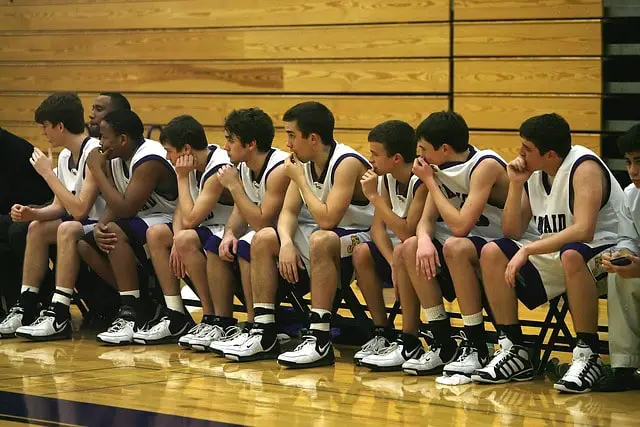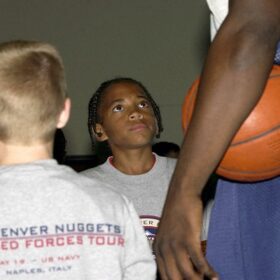Peering into the strategic nuances of basketball, the term “DNP” often sparks curiosity about its implications on the court and behind the scenes.
Introduction to DNP: Understanding the Basics
In the realm of professional basketball, the abbreviation ‘DNP’ stands for Did Not Play. It’s a term that surfaces in box scores and player statistics, indicating that a player was available for a game but did not get any playing time.
This designation raises immediate questions: Was it due to an injury, a tactical decision, or something else? Understanding the layers behind a ‘DNP’ is crucial for fans and analysts alike as it can reflect a wide range of scenarios impacting a player’s role and a team’s strategy.
Reasons Behind a DNP: From Coaches’ Decisions to Player Health
The reasons leading to a ‘DNP’ are varied. A player might not see game action due to a coach’s strategic decision, often referred to as ‘DNP-CD‘ where ‘CD’ stands for Coach’s Decision.
Health concerns are another common reason, where a player is sidelined to recover from an injury, thus prioritizing long-term wellbeing over immediate game participation.
At times, personal matters may necessitate absence from play, respecting the player’s need to attend to life outside of basketball. Each ‘DNP’ carries its own story, some straightforward, while others may involve complex considerations within the team’s dynamics.
DNP-CD Explained: Distinguishing Between Rest and Strategy
When a player receives a ‘DNP-CD’ beside their name, it stands for ‘Did Not Play – Coach’s Decision’.
This specific designation indicates that a player was healthy and available to play, but was left out of the game for reasons decided by the coach.
These reasons can vary widely and often involve strategic planning or considerations beyond the player’s performance.
Strategic Rest: In the grueling schedule of a basketball season, strategic rest is a common reason behind a DNP-CD.
Teams may decide to rest their star players in preparation for more consequential games ahead, especially during a dense schedule or when a playoff position is already secured.
This proactive approach is intended to mitigate the risk of injury and ensure players are at their physical peak when it matters most.
Tactical Decisions: A coach might also use a DNP-CD to match up against the opposing team’s lineup more effectively.
In such scenarios, the decision is purely tactical, aimed at optimizing the team’s chances of winning a particular game.
For instance, a coach might bench a typically active player because the opponent’s playing style calls for a different strategic approach that doesn’t align with the player’s strengths or weaknesses.
The distinction between rest and strategy under the umbrella of DNP-CD is crucial for fans and commentators alike, as it sheds light on the coach’s vision for the team’s success and the player’s role within it.
By analyzing the context and timing of DNP-CD decisions, one can gain a deeper understanding of the team’s long-term objectives and in-game adjustments.

The Immediate Impact of DNP on Players and Teams
The declaration of a ‘DNP’ can ripple through a team, influencing player morale and the overall dynamics within the locker room. This section delves into the short-term psychological and strategic implications that DNPs have on the players and their teams, offering insight into the nuanced decision-making process of coaches and the organization.
- Psychological Impact: The immediate psychological effect on players who receive a DNP can vary. While some may see it as a much-needed rest, others may experience a dip in confidence, especially if they are left in the dark about the reasons behind such decisions.
- Team Chemistry: DNPs can serve as a strategic tool for coaches to signal a need for performance improvement or as a means to manage player fatigue. However, these decisions must be handled with transparency to avoid creating tension within the team.
- Strategic Deployment: In the fast-paced season of basketball, DNPs can be a tactic to preserve the players for more critical matchups or to give emerging talent on the team an opportunity to shine.
Ultimately, the use of DNP requires a delicate balance, striving to maintain team cohesion while managing individual player needs and expectations.
The key lies in communication, with coaches needing to articulate their decisions clearly to mitigate misunderstanding and maintain morale.

Notable DNP Cases and Their Long-Term Effects
Over the years, the basketball world has witnessed several significant DNP cases that have raised questions about the implications of such decisions for player careers and team dynamics.
Analyzing these cases offers valuable insights into how DNPs can shape the future of players and franchises.
-
High-Profile Resting:
The strategy of resting star players has occasionally met with public and league criticism, particularly when it involves games with a large audience. Such DNPs have sparked debates about the balance between player well-being and the responsibilities towards fans and the league’s integrity.
-
Injury-Related DNPs:
Long-term injuries leading to DNPs often alter a player’s career trajectory. For instance, a series of DNPs due to injury might lead to a player falling out of favor in team rotation, or in contrast, they might return with a significantly improved play, transforming team strategy.
-
Impact on Trades and Transfers:
DNPs can also be a precursor to trades or shifts in the roster. Players who are frequently listed as DNP may find themselves in trade discussions, and such movements can change the course of a team’s season and even its identity.
-
Long-Term League Influence:
Notable DNP cases have also led to policy adjustments by the league. For example, the management of player rest, especially during back-to-back games, has been scrutinized and led to new guidelines to maintain a competitive balance and ensure the well-being of players.
The legacies of these DNP instances extend beyond the court, affecting the league’s reputation, the teams’ strategies, and the players’ legacies.
They underscore the complexity of the decision-making process regarding player health and team success, highlighting the need for nuanced and well-communicated policies.
Final Words
Understanding the term “DNP” is key to comprehending the complex strategies that unfold in professional basketball.
It reflects not just individual player circumstances but also broader coaching strategies and team dynamics.
While a “Did Not Play” designation can be a simple notation in a game’s box score, its reasons and implications can be multifaceted, ranging from tactical decisions to health management.
Recognizing the various factors that lead to a DNP helps fans and aspiring players alike appreciate the intricate decisions made by coaching staffs and the adaptability required of professional athletes.
As we peel back the layers behind the simple acronym, we gain insight into the nuanced decision-making that contributes to the high-stakes environment of professional basketball.






